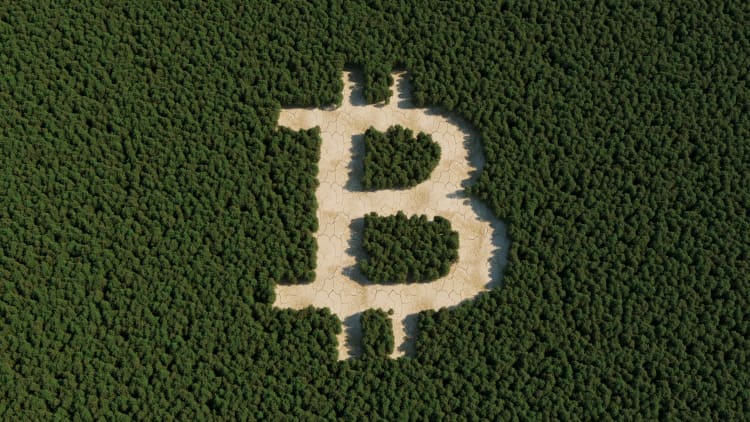Ahmad Abu Daher repairing mining gear within the basement of a house in Zaarouriyeh.
Ahmad Abu Daher
It takes quite a bit to maintain a grassroots cryptocurrency mining enterprise up and working in Lebanon. Ahmad Abu Daher says he and his crew of greater than 40 Lebanese and Syrian staff are working across the clock to man 1000’s of machines throughout the nation.
“We won’t sleep. We won’t have any break,” the 22-year-old Abu Daher instructed CNBC at 2:36 A.M. Lebanon time. “All of my crew are nonetheless awake. They do not sleep. Our shift is working 16 hours per day, and typically, as much as 18 or 19 hours.”
Abu Daher’s voice competes with the sound of machines whirring within the background, every crunching 1000’s of difficult math equations to provide a mixture of crypto tokens – now a significant supply of revenue in a rustic the place cash has stopped making sense.
Lebanon as soon as boasted a thriving and resilient banking sector that attracted the world’s elite. However after a long time of battle, dangerous spending choices by the federal government, and monetary insurance policies that the World Bank has in comparison with a Ponzi scheme, the country’s economy is in ruin.
Mining gear at considered one of Ahmad Abu Daher’s crypto farms in Lebanon.
Ahmad Abu Daher
The native forex has misplaced greater than 95% of its worth since 2019, the minimal wage has plunged to $17 a month, pensions are just about nugatory, and checking account balances are simply numbers on paper. Banks shut with out warning and ATMs are sometimes both out of money or completely offline from nationwide blackouts. When locals are in a position to achieve entry to their accounts, many inform CNBC that they’ve grown accustomed to withdrawing cash at 15% of its unique value.
In opposition to this backdrop, Abu Daher jumped into the crypto mining enterprise just a little over two years in the past. He and a good friend started with three machines working on hydroelectric energy in Zaarouriyeh, a city 30 miles south of Beirut within the Chouf Mountains.
“After we began, it was our nice thought to generate income whereas sleeping or consuming,” mentioned Abu Daher. These days, Abu Daher says he’s on-line 20 hours a day.
An architect by coaching, Abu Daher noticed a number of different college college students unable to seek out work after commencement, so he realized he needed to be proactive, educating himself varied technical duties by watching YouTube movies.
Ahmad Abu Daher repairing mining gear within the basement of a house in Zaarouriyeh.
Ahmad Abu Daher
It has been 26 months since Abu Daher first arrange store, and he says that enterprise is flourishing.
He now has about 400 crypto farms with between 5 and 100 machines every, in 42 villages throughout the nation working on a mixture of hydropower, solar energy, and gas. Abu Daher says that he pulls in about $20,000 a month, and sometimes, half of these proceeds come from mining and the opposite half from promoting machines and buying and selling in crypto.
When CNBC requested for crypto change statements and copies of financial institution balances to corroborate the estimate, Abu Daher mentioned that the determine was pieced collectively from buying and selling, mining, and promoting machines, in a mixture of transactions involving money, checks, and tether, in addition to a number of crypto wallets.
Abu Daher actually has the trimmings of a mining baron.
“When Ahmad pulled up in a white Vary Rover to greet us and take us for a tour of the city, I used to be form of impressed,” mentioned Mohamad El Chamaa, a journalist at L’Orient Right this moment who beforehand reported on Abu Daher’s crypto mines. “I had identified him earlier than Covid when he was a university scholar on the structure division and I used to be his TA. It appeared just like the crypto enterprise was treating him effectively.”

Constructing a bitcoin mining enterprise
Abu Daher had just a few black swan occasions on his facet quickly after he broke into crypto mining.
In Might 2021, China expelled crypto miners, flooding the market with low-cost, used mining rigs and lowering competitors. This occurred as cryptocurrency costs climbed towards all-time report highs.
As geopolitics completely reshaped the panorama of the crypto mining business, Abu Daher and his crew started to construct out their very own farms throughout Lebanon with rigs acquired at fireplace sale costs from miners in China. Paying for these machines was not at all times easy.
“As a consequence of sanctions controls, issue with utilizing money, and particularly in Lebanon, the banking system and the shortcoming to make use of {dollars} or wire cash, USD tether is actually a key middleman forex between folks within the Chinese language {hardware} market to Lebanese purchasers,” mentioned Nicholas Shafer, a College of Oxford educational learning Lebanon’s crypto mining business.
Detailed administrative and political vector map of Lebanon.
Getty Pictures
Abu Daher’s farms span the nation, with roughly half of his gear within the hydro-rich Chouf vary, and the remaining 50% scattered all through Lebanon, together with within the Beqaa Valley, which is near the Syrian border, and presents solar energy instead electrical energy supply. (Although, as Shafer notes, the issue with photo voltaic is capability — photo voltaic sometimes doesn’t produce sufficient megawatts to mine at scale.)
Abu Daher additionally began to host rigs for folks dwelling throughout Lebanon, who wanted secure cash however lacked technical experience and entry to low-cost and regular electrical energy, because the nation typically experiences blackouts.
The mining boss does look like sharing these income along with his crew. Shafer, who performed subject analysis at a few of Abu Daher’s mining websites, says that of Abu Daher’s 40 staff, all obtain a proper wage starting from $800 to $4,000 per thirty days in U.S. {dollars} or in tether. The blacksmith, who makes the least of any of Abu Daher’s employees, earns greater than 26 occasions the minimal wage in Lebanon, in accordance with Shafer.
Abu Daher mines for a mixture of cryptocurrencies, together with litecoin, dogecoin, bitcoin, and ethereum basic — and in some instances, he has programmed the machines to modify to mine whichever is essentially the most worthwhile coin that day. He makes use of software program known as TeamViewer to remotely monitor and keep track of all this hardware.
“Every machine can mine many cash, and every coin has their particular equations,” defined Abu Daher. “Possibly in the present day the very best coin to mine is bitcoin, tomorrow it is litecoin, and the day after that, it is ethereum. We’re at all times transferring to have essentially the most revenue that we will.”
Round two-thirds of his clients are Lebanese, together with some mining for bitcoin, dogecoin, or litecoin as a technique to get spending cash for each day bills like gas and meals. One-quarter are Syrian, and the remaining 8% are a mixture of folks dwelling in Egypt, Turkey, France, and the UK.
With a few of his purchasers, Abu Daher is merely a custodian of the machines — housing them, cooling them, and offering regular electrical energy and robust web entry. He prices a price and in change, he offers them a lower of the mining proceeds in crypto. Others simply ask him to dealer the gear sale and set up it.
Ahmad Abu Daher and his good friend started mining ether with three machines working on hydroelectric energy in Zaarouriyeh, a city 30 miles south of Beirut within the Chouf Mountains. Abu Daher has since scaled his enterprise to 1000’s of machines unfold throughout Lebanon.
Ahmad Abu Daher
Not like the huge mining farms of Texas that stack lots of of 1000’s of machines into buildings the scale of a number of soccer stadiums, Abu Daher prefers to unfold out his electrical footprint, divvying up his 1000’s of miners in locations like shops, basements, and flats, every with 10 to twenty machines, except it is a home the place he can cut up up groupings of miners into completely different rooms. In change for the area, Abu Daher pays hire in money. In what was as soon as a barbershop, as an example, Abu Daher runs 15 ASICs.
“At first look, the city doesn’t seem like a lot of what you’d suppose a ‘mining’ city would seem like, however you then look contained in the storefronts which can be changing conventional companies, and also you get a greater feeling. For instance, considered one of Ahmad’s farms was a barbershop – there’s nonetheless a mirror inside and advertisements for magnificence merchandise – however make no mistake that it’s a absolutely fledged mining farm,” mentioned El Chamaa of among the mines within the Chouf vary.
He added that, “The mining farms themselves weren’t as spectacular as those I’ve seen on TikTok, however my eager commentary was that they get the job accomplished both means.”
Now, Abu Daher is attempting to teach the locals about mining, primarily as a result of he wants the additional manpower to maintain the enterprise going.
“We are attempting to let somebody in every village find out about mining within the function to assist us. We won’t cowl all of the machines we have now by my crew, as a result of we have now an enormous quantity of machines, and we’re promoting an enormous quantity of machines,” he mentioned.
AntMiner L3++ miners working at considered one of Ahmad Abu Daher’s crypto farms in Mghayriyeh within the Chouf Mountains.
Ahmad Abu Daher
Lifeline to ‘recent {dollars}’
In Oct. 2019, cash stopped making sense in Lebanon. After a season of unrest triggered by an ill-fated taxation scheme and years of financial mismanagement, banks first restricted withdrawals after which shut their doorways completely as a lot of the world descended into Covid lockdowns.
Hyperinflation took root. The native forex, which had a peg of 1,500 Lebanese kilos to $1 for 25 years, started to quickly depreciate. The road fee is now round 40,000 kilos to $1. After re-opening, the banks refused to maintain up with this excessive depreciation, and supplied a lot decrease change charges for U.S. {dollars} than they have been value on the open market.
Anti-government protesters participate in an indication in opposition to the political elites and the federal government, in Beirut, Lebanon, on August 8, 2020 after the huge explosion on the Port of Beirut.
STR | NurPhoto by way of Getty Pictures
Right this moment, withdrawals of U.S. {dollars} deposited into the Lebanese banking system earlier than 2019 are capped, and every so-called “lollar” is paid out at a fee value about 15% of its precise worth, in accordance with estimates from a number of locals and consultants dwelling throughout Lebanon.
In the meantime, banks nonetheless provide the total market-rate change fee for U.S. {dollars} deposited after 2019. These at the moment are identified colloquially as “recent {dollars}.”
Cryptocurrencies are risky — the worth of bitcoin has dropped about 70% from its peak a 12 months in the past — however the energy of incomes recent {dollars} is an enormous incentive for Lebanese to enter mining.
Rawad El Hajj, a 27-year-old with a advertising and marketing diploma, tells CNBC that his 11 machines mine for litecoin and dogecoin.
Rawad El Hajj
Rawad El Hajj, a 27-year-old with a advertising and marketing diploma, discovered about Abu Daher’s mining operation three years in the past via his brother.
“We began as a result of there may be not sufficient work in Lebanon,” El Hajj mentioned.
El Hajj, who lives south of the capital in a metropolis known as Barja, began small, buying two miners to start out.
“Then each month, we began to go larger and greater,” he mentioned.
Due to the gap to Abu Daher’s farms, El Hajj pays to outsource the work of internet hosting and sustaining the rigs. He tells CNBC that his 11 machines mine for litecoin and dogecoin, which collectively convey within the equal of about .02 bitcoin a month, or $360.
It is a related story for Salah Al Zaatare, an architect dwelling 20 minutes south of El Hajj within the coastal metropolis of Sidon. Al Zaatare tells CNBC that he started mining dogecoin and litecoin in March of this 12 months to reinforce his revenue. He now has 10 machines that he retains with Abu Daher. Al Zaatare’s machines are newer fashions so he pulls in additional than El Hajj — about $7,200 a month.
“I bought into it as a result of I feel it should turn out to be funding for the longer term,” Al Zaatare instructed CNBC.
Al Zaatare pulled all of his cash out of the financial institution earlier than the disaster hit in 2019, and he held onto that money till deciding to take a position his life financial savings into mining gear final 12 months.
“I haven’t got any downside now dwelling in Lebanon since I get recent {dollars} from mining,” mentioned Myriam Harfoush, a 32-year-old French instructor dwelling in Baakleen — a few 45-minute drive south of Beirut.
Harfoush, who trades in crypto on the facet, instructed CNBC in a WhatsApp message that she took all of her cash out of the financial institution initially of the disaster and now has mining machines in Zaarouriyeh. (Harfoush solely spoke to CNBC in written messages on WhatsApp, citing issues over talking by telephone.)
“If you may get the machine, and also you get the facility, you get the cash,” mentioned Shafer. “Crypto is one thing that with the proper sort of experience, you’ll be able to produce in your native context.”
Overhead energy traces transmit hydroelectricity to the encompassing cities.
Mohamad El Chamaa
The power dilemma
Cryptocurrencies like bitcoin, dogecoin, and litecoin are created via a course of often known as proof-of-work, wherein miners all over the world run high-powered computer systems that collectively validate transactions and concurrently create new tokens. The method requires plenty of electrical energy, and since that is the one variable value in a low-margin business, miners have a tendency to hunt out the most cost effective sources of energy.

Most of the time, renewables provide essentially the most aggressive pricing on electrical energy.
“It is a technique to convert a domestically stranded useful resource (electrical energy) into a world commodity,” defined Nic Carter, a companion at Castle Island Ventures, which focuses on blockchain investments. “Hydro, particularly run on the river, is a kind of basic sources which tends to have a supply-demand mismatch.”
Dammed hydro can higher accommodate fluctuations in demand and grid wants, whereas run-of-the-river hydro produces continuously, Carter tells CNBC.
Helium machine mounted on high of a home in Lebanon.
Mohamad El Chamaa
“So that you typically see these stranded or underutilized hydro sources being monetized a part of the time with bitcoin mining, as we noticed infamously in Sichuan and Yunnan in China,” continued Carter.
Abu Daher faucets right into a hydropower undertaking which harnesses electrical energy from the 90-mile Litani River that cuts throughout southern Lebanon. He says he’s getting 20 hours a day of electrical energy at outdated pre-inflationary charges.
“So principally, we’re paying very low-cost electrical energy, and we’re getting recent {dollars} via mining,” continued Abu Daher.
However the authorities, dealing with electrical shortages, is beginning to crack down.
In January, police raided a small crypto mining farm within the hydro-powered town of Jezzine, seizing and dismantling mining rigs within the course of. Quickly after, the Litani River Authority, which oversees the nation’s hydroelectric websites, reportedly said that “power intensive cryptomining” was “straining its sources and draining electrical energy.”
However Abu Daher tells CNBC he’s neither nervous about being raided — nor the government’s proposal to hike up the price of electricity.
“We had some conferences with the police, and we have no issues with them, as a result of we’re taking authorized electrical energy, and we’re not affecting the infrastructure,” he mentioned.
Whereas Abu Daher says that he has arrange a meter that formally tracks how a lot power his machines have consumed, different miners have allegedly hitched their rigs to the grid illegally and usually are not paying for energy.
Electrical energy harnessed from the Litani River transmits electrical energy to the Charles Helou energy station, which gives sufficient electrical energy to energy the mining farms within the space.
Mohamad El Chamaa
“Mainly, plenty of different individuals are having some points, as a result of they aren’t paying for electrical energy, and they’re affecting the infrastructure,” he mentioned.
Abu Daher, who has a knack for constructing artistic designs to resolve real-world issues, says that his subsequent purpose is making a closed power loop for his mining farms. He envisions a system wherein the warmth produced by the machines is harnessed and that geothermal power is repurposed to energy the miners, in addition to to warmth houses and hospitals within the villages the place these mines are positioned.
“As a substitute of shopping for gas to warmth up our houses, we might purchase mining machines. We produce warmth to warmth up our constructing, and on the identical time, we produce cash,” Abu Daher defined of his grand imaginative and prescient for the way forward for crypto mining in Lebanon.
Ahmad Abu Daher repairing mining gear within the basement of a house in Zaarouriyeh.
Ahmad Abu Daher
